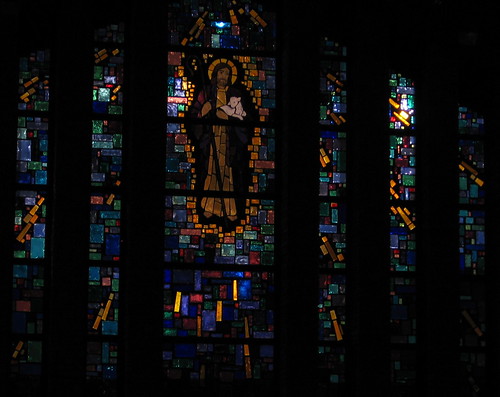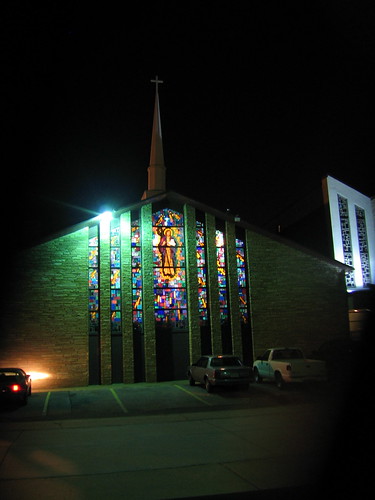
 Check out a whole raft of other fine photos at the Friday Photo Group. Have a blessed weekend, a happy new year, and May God bless you and yours.
Check out a whole raft of other fine photos at the Friday Photo Group. Have a blessed weekend, a happy new year, and May God bless you and yours.

 Check out a whole raft of other fine photos at the Friday Photo Group. Have a blessed weekend, a happy new year, and May God bless you and yours.
Check out a whole raft of other fine photos at the Friday Photo Group. Have a blessed weekend, a happy new year, and May God bless you and yours.
 And to Adam he said, "Because you have listened to the voice of your wife and have eaten of the tree of which I commanded you, "You shall not eat of it," cursed is the ground because of you; in pain you shall eat of it all the days of your life; thorns and thistles it shall bring forth for you; and you shall eat the plants of the field." (Genesis 3:17, 18, ESV)
I know this is not what you expected. You might ask "So what's with a title like Joy to the World, followed by a picture of a hand full of grass burrs, followed by a Scripture passage about the fall" The third verse of this great hymn by Isaac Watts is the key to this post:
No more let sins and sorrows grow,
Nor thorns infest the ground;
He comes to make his blessings flow
Far as the curse is found.
And to Adam he said, "Because you have listened to the voice of your wife and have eaten of the tree of which I commanded you, "You shall not eat of it," cursed is the ground because of you; in pain you shall eat of it all the days of your life; thorns and thistles it shall bring forth for you; and you shall eat the plants of the field." (Genesis 3:17, 18, ESV)
I know this is not what you expected. You might ask "So what's with a title like Joy to the World, followed by a picture of a hand full of grass burrs, followed by a Scripture passage about the fall" The third verse of this great hymn by Isaac Watts is the key to this post:
No more let sins and sorrows grow,
Nor thorns infest the ground;
He comes to make his blessings flow
Far as the curse is found.
 Let me tell you how far the curse is found on my place. It is found at the foot of a small tree, with a good deal of bark and cambium scraped from its tiny trunk; damag by deer antlers in the middle of the previous night. One big buck had "scraped" a number of our smaller trees, including several small apple trees and the White pine pictured below. The pine had been our Christmas tree three seasons back. When I bent down to get a close shot of the damage, my left hand quickly came up with a hand-full of this curse.
And that is where Joy to the World comes in. That is what Christmas is all about. Christ came to put an end to all of that, and though we live in this age of the already but not yet, we have a sure hope that one day sin and sorrow will grow no more, neither will thorns infest the ground. Also, this creation will not strive with it self, so that rutting bucks won't mindlessly try to destroy young trees. Sure, these things are nothing compared to personal sin and misery and estrangement from God, but they are connected and related.
So the next time your car breaks down or your co-worker dissapoints you, or you come down with the flu, or a loved one dies; then remember just how far the curse is found, and what great joy it is to this fallen world and all in it, that Christ came to fix all of that. That is what Christmas is all about.
Let me tell you how far the curse is found on my place. It is found at the foot of a small tree, with a good deal of bark and cambium scraped from its tiny trunk; damag by deer antlers in the middle of the previous night. One big buck had "scraped" a number of our smaller trees, including several small apple trees and the White pine pictured below. The pine had been our Christmas tree three seasons back. When I bent down to get a close shot of the damage, my left hand quickly came up with a hand-full of this curse.
And that is where Joy to the World comes in. That is what Christmas is all about. Christ came to put an end to all of that, and though we live in this age of the already but not yet, we have a sure hope that one day sin and sorrow will grow no more, neither will thorns infest the ground. Also, this creation will not strive with it self, so that rutting bucks won't mindlessly try to destroy young trees. Sure, these things are nothing compared to personal sin and misery and estrangement from God, but they are connected and related.
So the next time your car breaks down or your co-worker dissapoints you, or you come down with the flu, or a loved one dies; then remember just how far the curse is found, and what great joy it is to this fallen world and all in it, that Christ came to fix all of that. That is what Christmas is all about.
 For the creation waits with eager longing for the revealing of the sons of God. For the creation was subjected to futility, not willingly, but because of him who subjected it, in hope that the creation itself will be set free from its bondage to decay and obtain the freedom of the glory of the children of God. For we know that the whole creation has been groaning together in the pains of childbirth until now. And not only the creation, but we ourselves, who have the firstfruits of the Spirit, groan inwardly as we wait eagerly for adoption as sons, the redemption of our bodies. (Romans 8:19-23, ESV)
Check out some other blogger's fine Friday Photos over at the Friday Photo Group
For the creation waits with eager longing for the revealing of the sons of God. For the creation was subjected to futility, not willingly, but because of him who subjected it, in hope that the creation itself will be set free from its bondage to decay and obtain the freedom of the glory of the children of God. For we know that the whole creation has been groaning together in the pains of childbirth until now. And not only the creation, but we ourselves, who have the firstfruits of the Spirit, groan inwardly as we wait eagerly for adoption as sons, the redemption of our bodies. (Romans 8:19-23, ESV)
Check out some other blogger's fine Friday Photos over at the Friday Photo Group
 (Photo, courtesy of Timmy Brister.) You might, and you might not be comfortable at Mar's Hill church, pastored by the fire-brand preacher Mark Driscoll. From what I can gather, Mar's Hill is a bit on the edge as regards worship style. You can't get past that preaching, though. I do enjoy Driscoll's preaching, because he preaches the plain Gospel with no apologies. His style seems to cut through the fluff and do what the preaching of God's word is suppose to do: give glory and honor to God, through the person of Jesus Christ. I thank God he is where he is and is doing what he is doing.
I'm not sure exactly how to express this, but I am fairly convinced that Driscoll has captured, at least in part, something that has gone largely missing in "church" for quite some time now. Let's describe it as a quality, and let's call that quality masculinity. Some call Driscoll's style nothing more than taxi-cab-driver crudity, but I believe there is something more there. Now before you turn me off, hear me out. I am not saying that he has this quality down to a science by any stretch, but after I got over the initial shock of Driscoll's graphic approach to preaching, I detected in him a sincere love for two things. Hopefully you will see it coming through too, if you get over your prejudices and just listen to his preaching. Those two passions that I detected in all of his preaching I have heard so far were a love for the lost in Seattle and around the world, and a love for Jesus Christ. I hear a radically different style, to say the least, but I have also heard the Gospel, crystal clear in every message of his I have heard to this point. If I am not mistaken, this is what is called contextualization, or cultural relevance, without loosing the message. His ministry is reaching many people in the largely unreached Northwest, many people who have been hostile to our parents' and grandparents' styles and methods of evangelism and worship. And to all of that I say praise be to God!
A good bit of what is contained in the previous two paragraphs has been sitting in my future-posts folder for months. Impressed with the pastor who calls himself a "jack hammer for Jesus", among other things, I thought it would be neat to write something about him. I had never even heard of Mark Driscoll six months ago. The name kept popping up here and there this summer on the blogs, so one day, seeing a link for a sermon by Driscoll, I downloaded it and listened. It was edgy, harsh at points, even shocking, but refreshing. My next encounter with Driscoll was in connection with the recent Desiring God conference, where Driscoll was a scheduled speaker. I realized more fully Driscoll was a bit of a controversial figure in the larger evangelical arena when I heard comments by Piper and others in one of the two Q&A audios released from the conference. You can listen or download all of the audio from that conference, including both Q&A sessions from the web site at Desiring God.
The topic I thought I would concentrate on at the time I first decided to post on him was his attire, his lack of a sense of dressing for the occasion, as that was alluded to once or twice in the afore-mentioned audios at the Desiring God conference. I was going to say something about whether he might consider dressing up for a daughter's wedding, say in a dozen years or so. I was going to be largely positive, recommending you listen to some of his messages, with the petty caveat on appearances and special occasions.
My focus on Mark Driscoll all changed last week when, thanks to a post by Pastor Art Rogers, I downloaded and listened to a bit of audio featuring a Q&A session by Dr. Paige Patterson in chapel on November 28 at Southwestern Seminary. The very first question came from a professor at Southwestern, Jason Lee, who quoted from Mark Driscoll's book, The Radical Reformission. In the chapter titled The Sin of Lite Beer, Driscoll makes the case that women's suffrage and prohibition were both movements which were the result of the feminization of the Church around the turn of the 20th century. Professor Lee went on to read a section from the book:
(Photo, courtesy of Timmy Brister.) You might, and you might not be comfortable at Mar's Hill church, pastored by the fire-brand preacher Mark Driscoll. From what I can gather, Mar's Hill is a bit on the edge as regards worship style. You can't get past that preaching, though. I do enjoy Driscoll's preaching, because he preaches the plain Gospel with no apologies. His style seems to cut through the fluff and do what the preaching of God's word is suppose to do: give glory and honor to God, through the person of Jesus Christ. I thank God he is where he is and is doing what he is doing.
I'm not sure exactly how to express this, but I am fairly convinced that Driscoll has captured, at least in part, something that has gone largely missing in "church" for quite some time now. Let's describe it as a quality, and let's call that quality masculinity. Some call Driscoll's style nothing more than taxi-cab-driver crudity, but I believe there is something more there. Now before you turn me off, hear me out. I am not saying that he has this quality down to a science by any stretch, but after I got over the initial shock of Driscoll's graphic approach to preaching, I detected in him a sincere love for two things. Hopefully you will see it coming through too, if you get over your prejudices and just listen to his preaching. Those two passions that I detected in all of his preaching I have heard so far were a love for the lost in Seattle and around the world, and a love for Jesus Christ. I hear a radically different style, to say the least, but I have also heard the Gospel, crystal clear in every message of his I have heard to this point. If I am not mistaken, this is what is called contextualization, or cultural relevance, without loosing the message. His ministry is reaching many people in the largely unreached Northwest, many people who have been hostile to our parents' and grandparents' styles and methods of evangelism and worship. And to all of that I say praise be to God!
A good bit of what is contained in the previous two paragraphs has been sitting in my future-posts folder for months. Impressed with the pastor who calls himself a "jack hammer for Jesus", among other things, I thought it would be neat to write something about him. I had never even heard of Mark Driscoll six months ago. The name kept popping up here and there this summer on the blogs, so one day, seeing a link for a sermon by Driscoll, I downloaded it and listened. It was edgy, harsh at points, even shocking, but refreshing. My next encounter with Driscoll was in connection with the recent Desiring God conference, where Driscoll was a scheduled speaker. I realized more fully Driscoll was a bit of a controversial figure in the larger evangelical arena when I heard comments by Piper and others in one of the two Q&A audios released from the conference. You can listen or download all of the audio from that conference, including both Q&A sessions from the web site at Desiring God.
The topic I thought I would concentrate on at the time I first decided to post on him was his attire, his lack of a sense of dressing for the occasion, as that was alluded to once or twice in the afore-mentioned audios at the Desiring God conference. I was going to say something about whether he might consider dressing up for a daughter's wedding, say in a dozen years or so. I was going to be largely positive, recommending you listen to some of his messages, with the petty caveat on appearances and special occasions.
My focus on Mark Driscoll all changed last week when, thanks to a post by Pastor Art Rogers, I downloaded and listened to a bit of audio featuring a Q&A session by Dr. Paige Patterson in chapel on November 28 at Southwestern Seminary. The very first question came from a professor at Southwestern, Jason Lee, who quoted from Mark Driscoll's book, The Radical Reformission. In the chapter titled The Sin of Lite Beer, Driscoll makes the case that women's suffrage and prohibition were both movements which were the result of the feminization of the Church around the turn of the 20th century. Professor Lee went on to read a section from the book:
"Prohibition is a pitiful result of syncretism and sectarianism. It matters because alcohol is a very real example of the pitfalls of syncretism and sectarianism. Prohibition began as a syncronistic liberalism that took away alcohol and the Christian freedom to drink. This happened because churches aligned themselves with a non-christian feminism that attempted to eliminate the pub as a gathering place for men to do theology, politics, and business. This syncretism undermined the clear teachings of Scripture, in an effort to fabricate a theology that supported its cultural form of morality."Professor Lee then asked Dr. Patterson if he agreed with Driscoll's assessment or not, and why. Dr. Patterson's reply was the most slick, subtle, ad hominem argument I have ever heard. Without giving any evidence for his objection to the position whatsoever, Dr. Patterson moved on with his worn out rendition of why alcohol is not "the best" for the Christian, with a bad joke thrown in for good measure. Here's Dr. Patterson's response. You have got to see it to appreciate it:
"Well, first of all, let me begin by saying Driscoll is an individual that I think that you would be well to read some of. He is a very provocative thinker, and had some great suggestions along the way. This is probably not one of them. I would say in this regard that he has made himself relatively famous, or infamous, as the case may be, as a proponent of the consumption of beverage alcohol. I find his linking of feminization of the church with prohibition to be a very unlikely scenario, to say the least. The two things I would say is that I do not believe there is a precise passage of Scripture that says you will not drink, what the Bible is very clear about is statements like this. Proverbs 20:1 Wine is a mocker, strong drink is raging, and whosovever is deceived thereby is not wise. Now very interestingly we've got a situation that exists right now in church life in America where people are saying "well, it's fine to drink, you just shouldn't get drunk. Drunkenness is wrong." Well that fails to observe that drunkenness is largely the result of drinking. In the second place it's very interesting that in Proverbs 20:1 nothing is said about drunkenness at all. What it says is that Wine is a mocker, strong drink is raging and whosoever is deceived thereby is not wise. Now if Brother Driscoll or anybody else wants to be in the category of the not-wise, then that's their privilege. I'm going to come down in the area of the wise, at least on this one, and I'm going to say that there is every reason in the world why a Christian ought to leave alone anything that enslaves him.Wow! What can you say to that? To begin with, I could be wrong, but I don't remember anywhere Mark Driscoll being "famous, or infamous, as the case may be" concerning alcohol. I know his preaching style and way of saying some things, along with his shabby dress, has gotten him in some hot water, but I haven't heard anyone comment on Driscoll's views on beverage alcohol. So, this sounds a bit like misrepresentation on the part of Dr. Patterson. Then there is the poor handling of Proverbs 20:1. It embarrasses me to hear someone in the position of Dr. Patterson abusing the hermeneutical tools of the literal principle and the analogy of Scripture (or perhaps, the absence of the use of these tools). That sets the stage for a negative way of calling a brother in Christ a fool. Dr. Patterson should be reminded of our Lord's warnings against such talk, found in Matthew 5:22. Probably least of all in this whole ramble by Dr. Patterson is the fact that he never gets around to actually refuting Mark Driscoll's assertion. Nothing like that good-ol-boy charm from Arkansas, and a bad joke to cloud the issue, and make everybody think you just made a slam dunk. It doesn't really matter if Driscoll was correct in his assesment, Dr. Patterson didn't prove him wrong, not in the least. Later on in the Q&A, a student asks Dr. Patterson what can the current generation do to continue the reforms in the SBC which were only begun at the Conservative Resurgence. Here is a portion of Dr. Patterson's response, beginning about 25:24 into the audio:
"Every generation must fight its battles. . . The way to understand this, I think is something that my colleagues will instantly agree with here, and will say this is easy to do. And here it is. Imagine that I were the devil . . . what would I do? Would I be worried about what's going on in the brothel? Unh-uh, wouldn't even show up. It's all going my way. Would I be worried about what's going on where ever Mark Driscoll is in a bar somewhere? No, I wouldn't worry about that. Got that going my way. What I would worry about is what's going on at Southwestern seminary. . .Well this last little dig was the capstone for me. What an arrogant, disrespectful treatment of a brother in Christ. What un-charitable, un-christlike behavior. Earlier, in this same Q&A session Patterson declared that we need to "get our people back to the simple business of witnessing." And then, here he is, almost in the same breath, making sport of the pastor of a church that is the fifteenth fastest growing church in America, in the least-churched metro area in America. If I were in any way associated with Southwestern, I would be ashamed. What bothers me even more, is the fact that I have found nothing in over a week on the Internet to indicate any outrage among our own denomination over such un-christian behavior. I guess the SBC is too busy fighting the big battles over Patterson, Rankin, and the IMB. After all, Driscoll isn't even a Southern Baptist. He's probably a heretic any way, because he doesn't dot his i's and cross his t's the way we do. Just a few days ago I listened to a sermon by Pastor Mark Driscoll titled Why Should We Worship Jesus?, dated November 21. In it he comments on his view on drink and how it relates to worship. For Driscoll, even beverage alcohol is a part of his 24/7 view of worship. You should listen to it. You can listen to the audio or watch the video. Just look in the sidebar on the right for "Why should we worship Jesus?" If you wonder about his passion for a lost world, you should listen to his message titled Loving the City, dated October 3. Don't let someone who doesn't know influence you against this fine servant of our Lord and Savior. This leads me to say something that is probably going to anger many, but that's too bad: I'm sick to my stomach of Southern Baptists - Not the simple man in the pew, that Dr. Patterson and so many others brag about being the backbone of the SBC, and not all of those faithful pastors and missionaries around the world - I'm sick of all of the stuffed shirts, most of them above the rank of humble pastor, those who hold some position of prominence on a state or national level. Any time they get around a microphone all they carry on about is Southern Baptist distinctives, as if we are God's gift to the world, and ever other denomination, Christian though they may be, are just second-class citizens in the kingdom of God. If you haven't figured this out yet, let me tell you, God doesn't need our 5,000 missionaries, or the biggest missionary machine in the world. God can pick up any old crooked stick and draw a straight line with it. God is working through many other denominations in small, quiet ways, that very few ever hear about. And maybe, just maybe, they are being more faithful, more effectual for eternity than we can even begin to realize. I'm also sick of hearing "How many baptisms did they have last year?" or some variation thereof. What I hear far too little of in the upper muckety-muck of the SBC is "Are we being faithful?" and "Are we honoring God?" I think we should all repent on our faces before God.
 The great snow fall of November 30, 2006, ending in the wee hours of December 1. The tracks are mine. At 12:30 a.m. I had to walk the last quarter mile to my house. After 22 miles driving from my work to the house, I got stuck in a drift climbing the hill just south of our house.
The great snow fall of November 30, 2006, ending in the wee hours of December 1. The tracks are mine. At 12:30 a.m. I had to walk the last quarter mile to my house. After 22 miles driving from my work to the house, I got stuck in a drift climbing the hill just south of our house.
 You notice It is a sunny day today. We will be running around in shorts and t-shirts by the weekend.
Those of you who enjoy snow, and love winter, you need to repent.
One more time: I hate winter!
Check out all of the other fabulous photos at the Friday Photo Group
You notice It is a sunny day today. We will be running around in shorts and t-shirts by the weekend.
Those of you who enjoy snow, and love winter, you need to repent.
One more time: I hate winter!
Check out all of the other fabulous photos at the Friday Photo Group
"Every century in our country there have been heresy trials. And people have been cast out of their own communities. It didn't end with Salem witch trials."It is a shame that this piece will possibly be heard by millions of "spiritual" unbelievers, and this program will even further solidify their moralistic therapeutic deistic spiritual unbelief. I am sure that Joe Thorn's comments in this post were not intended to be a full commentary on the program, so I am not being critical of him in this post. Having a closeness, community-wise, to this story, I felt I needed to say something. What did trouble me a bit about Pastor Thorn's brief comments, and, again I am sure he had more thoughts on the subject than he revealed in his post, was the lack of a sense of anger over the reproach brought upon the Gospel. This man, as Pastor Thorn pointed out, has jettisoned a vital aspect of the Gospel. I can understand sadness over the man's soul, for it is in grave danger, but our love for the Gospel should cause us to rise up as Paul did and say:
But even if we or an angel from heaven should preach to you a gospel contrary to the one we preached to you, let him be accursed. As we have said before, so now I say again: If anyone is preaching to you a gospel contrary to the one you received, let him be accursed. (Galatians 1:8,9, ESV)All is not lost, however, in the airing of this piece on Carlton Pearson. God can draw a straight line with a crooked stick. There are some positive things to say about this piece:
 Last Tuesday evening we went to the community service that our church is involved in through the local "West Side Ministerial Alliance". The Alliance is represented by a variety of church denominations, but not as diverse as we could be. They are all baptistic, mostly Anglo, some charismatic. Our hosting church this year was Red Fork Baptist Church.
I always enjoy these community services, held around Thanksgiving, though generally not on account of the Christ-centered emphasis. These community services help me keep things in perspective at my own church. The music at my own church frustrates me at times, but after just a short time at this year's community service I was realizing the far surpassing value of our singing service. We have a better Minister of Music, better hymn book, far heartier congregation of singers, and two angels on piano and organ.
On the preaching of the word, my pastor was not slated to preach this year. The pastor of the local AOG church was. I am always curious and eager to hear what any preacher of God's word has to offer, but not because I don't have a faithful pastor at my own church. I just enjoy good preaching. I wasn't dissapointed. After the preacher got up and tried to tell us that doctrine doesn't matter, because it's all about unity after all, after close to a dozen lame jokes, then my pastor got up and prayed the best five-minute message you have ever heard in a closing prayer at a community service.
Last Tuesday evening we went to the community service that our church is involved in through the local "West Side Ministerial Alliance". The Alliance is represented by a variety of church denominations, but not as diverse as we could be. They are all baptistic, mostly Anglo, some charismatic. Our hosting church this year was Red Fork Baptist Church.
I always enjoy these community services, held around Thanksgiving, though generally not on account of the Christ-centered emphasis. These community services help me keep things in perspective at my own church. The music at my own church frustrates me at times, but after just a short time at this year's community service I was realizing the far surpassing value of our singing service. We have a better Minister of Music, better hymn book, far heartier congregation of singers, and two angels on piano and organ.
On the preaching of the word, my pastor was not slated to preach this year. The pastor of the local AOG church was. I am always curious and eager to hear what any preacher of God's word has to offer, but not because I don't have a faithful pastor at my own church. I just enjoy good preaching. I wasn't dissapointed. After the preacher got up and tried to tell us that doctrine doesn't matter, because it's all about unity after all, after close to a dozen lame jokes, then my pastor got up and prayed the best five-minute message you have ever heard in a closing prayer at a community service.
 One thing that surpassed anything I have seen in a church on the West side was their stained glass. The photos pictured here look out over the people as they walk into the sanctuary. There was quite a bit more glass around the building, but this was the only one that was lit up for a decent shot. Apparentely Red Fork Baptist Church is a very missions minded church. Lining the walls of the vestibule and along both sides of the main sanctuary were flags from all of the countries where Southern Baptist missionaries are serving. I had never seen this done before; very interesting, and quite colorful. It seems to be an effective reminder of what the great commission is all about.
Don't forget to go see all of the great photos at the Friday Photo Group.
One thing that surpassed anything I have seen in a church on the West side was their stained glass. The photos pictured here look out over the people as they walk into the sanctuary. There was quite a bit more glass around the building, but this was the only one that was lit up for a decent shot. Apparentely Red Fork Baptist Church is a very missions minded church. Lining the walls of the vestibule and along both sides of the main sanctuary were flags from all of the countries where Southern Baptist missionaries are serving. I had never seen this done before; very interesting, and quite colorful. It seems to be an effective reminder of what the great commission is all about.
Don't forget to go see all of the great photos at the Friday Photo Group.
 Ivy-leaved Cyclamen, Cyclamen hedrerifolium is a treat for me this time of year, when few other plants are blooming. The foliage, which is remarkable in its own right, dissapears when spring turns hot.
Ivy-leaved Cyclamen, Cyclamen hedrerifolium is a treat for me this time of year, when few other plants are blooming. The foliage, which is remarkable in its own right, dissapears when spring turns hot.
 The Blossoms begin sparingly in October, and then the foliage returns in November. At this time the inverted blossoms, looking earthward with petals pointing backward to the sky, begin to appear more abundantly. They will continue to bloom well into the new year.
The Blossoms begin sparingly in October, and then the foliage returns in November. At this time the inverted blossoms, looking earthward with petals pointing backward to the sky, begin to appear more abundantly. They will continue to bloom well into the new year.
 Once the flower has been pollinated, the petals fade and fall, and the flower stem begins to curl up so that the "fruit" containing the developing seeds will be in contact with the soil when the seed pod dries and opens in about a month.
What can we do with this for a Christian application? Well, as pretty and neat as the Hardy Cyclamen is Christians should not follow its example. We should keep our faces turned upward, toward the Father above, and we should seek to scatter our seeds just a bit farther afield.
Don't forget to look at all of the great pics over at the Friday Photo Group. Have a great weekend. This Sunday, worship our great God and Savior with all your heart, mind, and soul.
Once the flower has been pollinated, the petals fade and fall, and the flower stem begins to curl up so that the "fruit" containing the developing seeds will be in contact with the soil when the seed pod dries and opens in about a month.
What can we do with this for a Christian application? Well, as pretty and neat as the Hardy Cyclamen is Christians should not follow its example. We should keep our faces turned upward, toward the Father above, and we should seek to scatter our seeds just a bit farther afield.
Don't forget to look at all of the great pics over at the Friday Photo Group. Have a great weekend. This Sunday, worship our great God and Savior with all your heart, mind, and soul.
 In a totally separate genus, Aesculus, is a number of tree species that go by the common name Horse-chestnut, whose nuts are anything but edible. Also known as Red Buckeye, pictured below is a couple of seeds, still in the husk of Aesculus pavia.
In a totally separate genus, Aesculus, is a number of tree species that go by the common name Horse-chestnut, whose nuts are anything but edible. Also known as Red Buckeye, pictured below is a couple of seeds, still in the husk of Aesculus pavia.
 While still in their husks, still hanging on the tree, each kind of Chestnut is easily distinguished from the other, but once they have left their context of origin, you have to be very careful. One must look very closely to tell the two apart. It is very important to do so, as eating the wrong nut could do great harm.
That is the beauty of the binomial naming system of genus and species, invented by Carl Linnaeus (1707-1778). Names mean something, and they mean the same thing today that they did a couple of hundred years ago, and they will still mean the same thing a hundred years hince, if the Lord tarries.
Wouldn't it be nice if words held that precise quality in church matters for more than a decade, words like evangelical, fundamentalist, and Calvinism. We think we have a cute device that makes it all work, namely by adding prefixes such as pre-, post-, and hyper-. If the label doesn't fit any more, because the object has changed, you just adjust the label; post-evangelical, for instance. Surely there is a better way. Like when something changes, you call it something else. It is kind of like sufixing every policical scandal in the last thirty years with -gate. Somebody give me some aspirin, my head hurts.
Check out all of the really fine photos at the Friday Photo Group.
While still in their husks, still hanging on the tree, each kind of Chestnut is easily distinguished from the other, but once they have left their context of origin, you have to be very careful. One must look very closely to tell the two apart. It is very important to do so, as eating the wrong nut could do great harm.
That is the beauty of the binomial naming system of genus and species, invented by Carl Linnaeus (1707-1778). Names mean something, and they mean the same thing today that they did a couple of hundred years ago, and they will still mean the same thing a hundred years hince, if the Lord tarries.
Wouldn't it be nice if words held that precise quality in church matters for more than a decade, words like evangelical, fundamentalist, and Calvinism. We think we have a cute device that makes it all work, namely by adding prefixes such as pre-, post-, and hyper-. If the label doesn't fit any more, because the object has changed, you just adjust the label; post-evangelical, for instance. Surely there is a better way. Like when something changes, you call it something else. It is kind of like sufixing every policical scandal in the last thirty years with -gate. Somebody give me some aspirin, my head hurts.
Check out all of the really fine photos at the Friday Photo Group.
"Disputatio pro Declaratione Virtutis Indulgentiarum." Martin LutherAmore et studio elucidande veritatis hec subscripta disputabuntur Wittenberge, Presidente R. P. Martino Lutther, Artium et S. Theologie Magistro eiusdemque ibidem lectore Ordinario. Quare petit, ut qui non possunt verbis presentes nobiscum disceptare agant id literis absentes. In nomine domini nostri Hiesu Christi. Amen.
1. Dominus et magister noster Iesus Christus dicendo `Penitentiam agite &c.' omnem vitam fidelium penitentiam esse voluit.
2. Quod verbum de penitentia sacramentali (id est confessionis et satisfactionis, que sacerdotum ministerio celebratur) non potest intelligi. 3. Non tamen solam intendit interiorem, immo interior nulla est, nisi foris operetur varias carnis mortificationes. 4. Manet itaque pena, donec manet odium sui (id est penitentia vera intus), scilicet usque ad introitum regni celorum. 5. Papa non vult nec potest ullas penas remittere preter eas, quas arbitrio vel suo vel canonum imposuit. 6. Papa non potest remittere ullam culpam nisi declarando, et approbando remissam a deo Aut certe remittendo casus reservatos sibi, quibus contemptis culpa prorsus remaneret. 7. Nulli prorus remittit deus culpam, quin simul eum subiiciat humiliatum in omnibus sacerdoti suo vicario. 8. Canones penitentiales solum viventibus sunt impositi nihilque morituris secundum eosdem debet imponi.
9. Inde bene nobis facit spiritus sanctus in papa excipiendo in suis decretis semper articulum mortis et necessitatis. 10. Indocte et male faciunt sacerdotes ii, qui morituris penitentias canonicas in purgatorium reservant. 11. Zizania illa de mutanda pena Canonica in penam purgatorii videntur certe dormientibus episcopis seminata. 12. Olim pene canonice non post, sed ante absolutionem imponebantur tanquam tentamenta vere contritionis. 13. Morituri per mortem omnia solvunt et legibus canonum mortui iam sunt, habentes iure earum relaxationem. 14. Imperfecta sanitas seu charitas morituri necessario secum fert magnum timorem, tantoque maiorem, quanto minor fuerit ipsa. 15. Hic timor et horror satis est se solo (ut alia taceam) facere penam purgatorii, cum sit proximus desperationis horrori. 16. Videntur infernus, purgaturium, celum differre, sicut desperatio, prope desperatio, securitas differunt. 17. Necessarium videtur animabus in purgatorio sicut minni horrorem ita augeri charitatem. 18. Nec probatum videtur ullis aut rationibus aut scripturis, quod sint extra statum meriti seu augende charitatis. 19. Nec hoc probatum esse videtur, quod sint de sua beatitudine certe et secure, saltem omnes, licet nos certissimi simus. 20. Igitur papa per remissionem plenariam omnium penarum non simpliciter omnium intelligit, sed a seipso tantummodo impositarum. 21. Errant itaque indulgentiarum predicatores ii, qui dicunt per pape indulgentias hominem ab omni pena solvi et salvari. 22. Quin nullam remittit animabus in purgatorio, quam in hac vita debuissent secundum Canones solvere. 23. Si remissio ulla omnium omnino penarum potest alicui dari, certum est eam non nisi perfectissimis, i.e. paucissimis, dari. 24. Falli ob id necesse est maiorem partem populi per indifferentem illam et magnificam pene solute promissionem. 25. Qualem potestatem habet papa in purgatorium generaliter, talem habet quilibet Episcopus et Curatus in sua diocesi et parochia specialiter. 1. [26] Optime facit papa, quod non potestate clavis (quam nullam habet) sed per modum suffragii dat animabus remissionem. 2. [27] Hominem predicant, qui statim ut iactus nummus in cistam tinnierit evolare dicunt animam. 3. [28] Certum est, nummo in cistam tinniente augeri questum et avariciam posse: suffragium autem ecclesie est in arbitrio dei solius. 4. [29] Quis scit, si omnes anime in purgatorio velint redimi, sicut de s. Severino et Paschali factum narratur. 5. [30] Nullus securus est de veritate sue contritionis, multominus de consecutione plenarie remissionis. 6. [31] Quam rarus est vere penitens, tam rarus est vere indulgentias redimens, i. e. rarissimus. 7. [32] Damnabuntur ineternum cum suis magistris, qui per literas veniarum securos sese credunt de sua salute. 8. [33] Cavendi sunt nimis, qui dicunt venias illas Pape donum esse illud dei inestimabile, quo reconciliatur homo deo. 9. [34] Gratie enim ille veniales tantum respiciunt penas satisfactionis sacramentalis ab homine constitutas. 10. [35] Non christiana predicant, qui docent, quod redempturis animas vel confessionalia non sit necessaria contritio. 11. [36] Quilibet christianus vere compunctus habet remissionem plenariam a pena et culpa etiam sine literis veniarum sibi debitam. 12. [37] Quilibet versus christianus, sive vivus sive mortuus, habet participationem omnium bonorum Christi et Ecclesie etiam sine literis veniarum a deo sibi datam. 13. [38] Remissio tamen et participatio Pape nullo modo est contemnenda, quia (ut dixi) est declaratio remissionis divine. 14. [39] Difficillimum est etiam doctissimis Theologis simul extollere veniarum largitatem et contritionis veritatem coram populo. 15. [40] Contritionis veritas penas querit et amat, Veniarum autem largitas relaxat et odisse facit, saltem occasione. 16. [41] Caute sunt venie apostolice predicande, ne populus false intelligat eas preferri ceteris bonis operibus charitatis. 17. [42] Docendi sunt christiani, quod Pape mens non est, redemptionem veniarum ulla ex parte comparandam esse operibus misericordie. 18. [43] Docendi sunt christiani, quod dans pauperi aut mutuans egenti melius facit quam si venias redimereet. 19. [44] Quia per opus charitatis crescit charitas et fit homo melior, sed per venias non fit melior sed tantummodo a pena liberior. 20. [45] Docendi sunt christiani, quod, qui videt egenum et neglecto eo dat pro veniis, non idulgentias Pape sed indignationem dei sibi vendicat. 21. [46] Docendi sunt christiani, quod nisi superfluis abundent necessaria tenentur domui sue retinere et nequaquam propter venias effundere.
22. [47] Docendi sunt christiani, quod redemptio veniarum est libera, non precepta. 23. [48] Docendi sunt christiani, quod Papa sicut magis eget ita magis optat in veniis dandis pro se devotam orationem quam promptam pecuniam. 24. [49] Docendi sunt christiani, quod venie Pape sunt utiles, si non in cas confidant, Sed nocentissime, si timorem dei per eas amittant. 25. [50] Docendi sunt christiani, quod si Papa nosset exactiones venialium predicatorum, mallet Basilicam s. Petri in cineres ire quam edificari cute, carne et ossibus ovium suarum. 1. [51] Docendi sunt christiani, quod Papa sicut debet ita vellet, etiam vendita (si opus sit) Basilicam s. Petri, de suis pecuniis dare illis, a quorum plurimis quidam concionatores veniarum pecuniam eliciunt. 2. [52] Vana est fiducia salutis per literas veniarum, etiam si Commissarius, immo Papa ipse suam animam pro illis impigneraret. 3. [53] Hostes Christi et Pape sunt ii, qui propter venias predicandas verbum dei in aliis ecclesiis penitus silere iubent. 4. [54] Iniuria fit verbo dei, dum in eodem sermone equale vel longius tempus impenditur veniis quam illi. 5. [55] Mens Pape necessario est, quod, si venie (quod minimum est) una campana, unis pompis et ceremoniis celebrantur, Euangelium (quod maximum est) centum campanis, centum pompis, centum ceremoniis predicetur. 6. [56] Thesauri ecclesie, unde Pape dat indulgentias, neque satis nominati sunt neque cogniti apud populum Christi. 7. [57] Temporales certe non esse patet, quod non tam facile eos profundunt, sed tantummodo colligunt multi concionatorum. 8. [58] Nec sunt merita Christi et sanctorum, quia hec semper sine Papa operantur gratiam hominis interioris et crucem, mortem infernumque exterioris. 9. [59] Thesauros ecclesie s. Laurentius dixit esse pauperes ecclesie, sed locutus est usu vocabuli suo tempore. 10. [60] Sine temeritate dicimus claves ecclesie (merito Christi donatas) esse thesaurum istum. 11. [61] Clarum est enim, quod ad remissionem penarum et casuum sola sufficit potestas Pape. 12. [62] Verus thesaurus ecclesie est sacrosanctum euangelium glorie et gratie dei. 13. [63] Hic autem est merito odiosissimus, quia ex primis facit novissimos. 14. [64] Thesaurus autem indulgentiarum merito est gratissimus, quia ex novissimis facit primos. 15. [65] Igitur thesauri Euangelici rhetia sunt, quibus olim piscabantur viros divitiarum. 16. [66] Thesauri indulgentiarum rhetia sunt, quibus nunc piscantur divitias virorum. 17. [67] Indulgentie, quas concionatores vociferantur maximas gratias, intelliguntur vere tales quoad questum promovendum. 18. [68] Sunt tamen re vera minime ad gratiam dei et crucis pietatem comparate. 19. [69] Tenentur Episcopi et Curati veniarum apostolicarum Commissarios cum omni reverentia admittere. 20. [70] Sed magis tenentur omnibus oculis intendere, omnibus auribus advertere, ne pro commissione Pape sua illi somnia predicent. 21. [71] Contra veniarum apostolicarum veritatem qui loquitur, sit ille anathema et maledictus. 22. [72] Qui vero, contra libidinem ac licentiam verborum Concionatoris veniarum curam agit, sit ille benedictus. 23. [73] Sicut Papa iuste fulminat eos, qui in fraudem negocii veniarum quacunque arte machinantur, 24. [74] Multomagnis fulminare intendit eos, qui per veniarum pretextum in fraudem sancte charitatis et veritatis machinantur, 25. [75] Opinari venias papales tantas esse, ut solvere possint hominem, etiam si quis per impossibile dei genitricem violasset, Est insanire.
1. [76] Dicimus contra, quod venie papales nec minimum venialium peccatorum tollere possint quo ad culpam. 2. [77] Quod dicitur, nec si s. Petrus modo Papa esset maiores gratias donare posset, est blasphemia in sanctum Petrum et Papam. 3. [78] Dicimus contra, quod etiam iste et quilibet papa maiores habet, scilicet Euangelium, virtutes, gratias, curationum &c. ut 1. Co. XII. 4. [79] Dicere, Crucem armis papalibus insigniter erectam cruci Christi equivalere, blasphemia est. 5. [80] Rationem reddent Episcopi, Curati et Theologi, Qui tales sermones in populum licere sinunt. 6. [81] Facit hec licentiosa veniarum predicatio, ut nec reverentiam Pape facile sit etiam doctis viris redimere a calumniis aut certe argutis questionibus laicorm. 7. [82] Scilicet. Cur Papa non evacuat purgatorium propter sanctissimam charitatem et summam animarum necessitatem ut causam omnium iustissimam, Si infinitas animas redimit propter pecuniam funestissimam ad structuram Basilice ut causam levissimam? 8. [83] Item. Cur permanent exequie et anniversaria defunctorum et non reddit aut recipi permittit beneficia pro illis instituta, cum iam sit iniuria pro redemptis orare? 9. [84] Item. Que illa nova pietas Dei et Pape, quod impio et inimico propter pecuniam concedunt animam piam et amicam dei redimere, Et tamen propter necessitatem ipsius met pie et dilecte anime non redimunt eam gratuita charitate? 10. [85] Item. Cur Canones penitentiales re ipsa et non usu iam diu in semet abrogati et mortui adhuc tamen pecuniis redimuntur per concessionem indulgentiarum tanquam vivacissimi? 11. [86] Item. Cur Papa, cuius opes hodie sunt opulentissimis Crassis crassiores, non de suis pecuniis magis quam pauperum fidelium struit unam tantummodo Basilicam sancti Petri? 12. [87] Item. Quid remittit aut participat Papa iis, qui per contritionem perfectam ius habent plenarie remissionis et participationis? 13. [88] Item. Quid adderetur ecclesie boni maioris, Si Papa, sicut semel facit, ita centies in die cuilibet fidelium has remissiones et participationes tribueret? 14. [89] Ex quo Papa salutem querit animarum per venias magis quam pecunias, Cur suspendit literas et venias iam olim concessas, cum sint eque efficaces? 15. [90] Hec scrupulosissima laicorum argumenta sola potestate compescere nec reddita ratione diluere, Est ecclesiam et Papam hostibus ridendos exponere et infelices christianos facere. 16. [91] Si ergo venie secundum spiritum et mentem Pape predicarentur, facile illa omnia solverentur, immo non essent. 17. [92] Valeant itaque omnes illi prophete, qui dicunt populo Christi `Pax pax,' et non est pax. 18. [93] Bene agant omnes illi prophete, qui dicunt populo Christi `Crux crux,' et non est crux. 19. [94] Exhortandi sunt Christiani, ut caput suum Christum per penas, mortes infernosque sequi studeant, 20. [95] Ac sic magis per multas tribulationes intrare celum quam per securitatem pacis confidant. M.D.Xvii.
 IMG_4390.JPG, originally uploaded by Wayne Hatcher.
IMG_4390.JPG, originally uploaded by Wayne Hatcher.Well fall has finally finally hit here in Oklahoma. Most of the trees are starting to turn a bit now. These Sassafras trees are really beginning to turn. My wife Suzan slipped out and took these shots while I wasn't looking (actually, I was asleep).
 IMG_4395.JPG, originally uploaded by Wayne Hatcher.
IMG_4395.JPG, originally uploaded by Wayne Hatcher. When I was a kid in the 60's I can remember watching Oral Roberts' preaching and healing services on my grandparents' black-and-white TV set. Always under a tent, he would be strutting up and down the platform, hands a waving, sweating like a politician with his shirt sleeves rolled up, and mopping his brow with a white handkercheif. That was pretty neat stuff for a kid of eight or nine.
Oral Roberts turned to building a univrsity in 1963 and a hospital in 1981, each here in Tulsa, Oklahoma. Pictured above is the prayer tower, located in the center of the Oral Roberts University campus, where it is told that in 1980, while up in the tower praying, Oral Roberts had a vision of a 900-foot Jesus who told him to build a hospital.
When I was a kid in the 60's I can remember watching Oral Roberts' preaching and healing services on my grandparents' black-and-white TV set. Always under a tent, he would be strutting up and down the platform, hands a waving, sweating like a politician with his shirt sleeves rolled up, and mopping his brow with a white handkercheif. That was pretty neat stuff for a kid of eight or nine.
Oral Roberts turned to building a univrsity in 1963 and a hospital in 1981, each here in Tulsa, Oklahoma. Pictured above is the prayer tower, located in the center of the Oral Roberts University campus, where it is told that in 1980, while up in the tower praying, Oral Roberts had a vision of a 900-foot Jesus who told him to build a hospital.
 The City of Faith hospital lasted only eight years, basically proving too costly to run. Tulsa, with a population of around 200,000 at the time, already had four major hospitals. The City of Faith is now called the Cityplex Towers, with a few floors leased out to a small specialty orthopedic surgery center. Beside some other non-medical businesses leasing space, the facility remains largely unoccupied. The common joke around here in the 80's was "Why would a faith healer need a hospital?"
All of the buildings on the ORU campus take on the futuristic architecture similar to the prayer tower and the Cityplex towers. It is an interesting campus, although I can't vouch the academics. Kathie Lee Gifford is an alumni, if that is any indication.
Don't forget to see all of the wonderful photos of all of those other "churchy" bloggers around at the Friday Photo Group. Y'all have a good weekend. When you go to church on Sunday, remember, it's not about us, it's all about giving glory to God and to the Lamb.
The City of Faith hospital lasted only eight years, basically proving too costly to run. Tulsa, with a population of around 200,000 at the time, already had four major hospitals. The City of Faith is now called the Cityplex Towers, with a few floors leased out to a small specialty orthopedic surgery center. Beside some other non-medical businesses leasing space, the facility remains largely unoccupied. The common joke around here in the 80's was "Why would a faith healer need a hospital?"
All of the buildings on the ORU campus take on the futuristic architecture similar to the prayer tower and the Cityplex towers. It is an interesting campus, although I can't vouch the academics. Kathie Lee Gifford is an alumni, if that is any indication.
Don't forget to see all of the wonderful photos of all of those other "churchy" bloggers around at the Friday Photo Group. Y'all have a good weekend. When you go to church on Sunday, remember, it's not about us, it's all about giving glory to God and to the Lamb.
 Our pastor Harris was out of the pulpit this Sunday on a much needed vacation. In his absence we were treated by the "pulpit supply" of Bowden McElroy. Many of you know Brother McElroy from his web log Interregnum. The message he delivered was entitled "Love Does No Harm", and was taken from Romans 13:8-10. Below you will find a brief outline. You can listen to the mp-3 audio here. Brother McElroy also supplied Trinity's pulpit back in March. You can listen/download those two messages at Trinity's audio site.
We are always sad to see pastor Rod absent from the pulpit, but brother McElroy was more than capable in providing a faithful gospel-centered message. Thank you, brother Bowden McElroy.
Our pastor Harris was out of the pulpit this Sunday on a much needed vacation. In his absence we were treated by the "pulpit supply" of Bowden McElroy. Many of you know Brother McElroy from his web log Interregnum. The message he delivered was entitled "Love Does No Harm", and was taken from Romans 13:8-10. Below you will find a brief outline. You can listen to the mp-3 audio here. Brother McElroy also supplied Trinity's pulpit back in March. You can listen/download those two messages at Trinity's audio site.
We are always sad to see pastor Rod absent from the pulpit, but brother McElroy was more than capable in providing a faithful gospel-centered message. Thank you, brother Bowden McElroy.
What makes the church? The church is a body, a group of believers, gathered together in the name of Christ who do this: Leave no debt outstanding, except the continuing debt to love one another. (Romans 13:8)Challenge: Think about what a church is. It is not a building, set of rules, or grouping of tradions. God has called you here to love one another.
- Love is an action, a debt to be paid, not a feeling.
- Love is ongoing. Love never quits. We can never say "enough".
- Love does no harm.

 These two photos were taken at Our Lord's Community Church, in Oklahoma City, where my wife and I met our daughter, son-in-law, and granddaughter to hear a couple of lectures by Michael Horton. Although I enjoyed both lectures that I heard, Dr Horton is at his best when he is leading a round-table discussion with his three friends, Kim Riddlebarger, Ken Jones, and Rod Rosembladt on The White Horse Inn. It was still well worth the trip.
The OKC Conference on Reformed Theology hosted Dr. Horton during their fifth annual Conference on Reformed Theology. Dr. Horton also spoke at the conference on Friday, but I couldn't get off work to go. The audio from the conference should be available at www.reformokc.com in the very near future. At least that is what I was told.
See all of the other excellent photos from Christian bloggers at the Friday Photo Group
These two photos were taken at Our Lord's Community Church, in Oklahoma City, where my wife and I met our daughter, son-in-law, and granddaughter to hear a couple of lectures by Michael Horton. Although I enjoyed both lectures that I heard, Dr Horton is at his best when he is leading a round-table discussion with his three friends, Kim Riddlebarger, Ken Jones, and Rod Rosembladt on The White Horse Inn. It was still well worth the trip.
The OKC Conference on Reformed Theology hosted Dr. Horton during their fifth annual Conference on Reformed Theology. Dr. Horton also spoke at the conference on Friday, but I couldn't get off work to go. The audio from the conference should be available at www.reformokc.com in the very near future. At least that is what I was told.
See all of the other excellent photos from Christian bloggers at the Friday Photo Group
"When we moved from Fort Worth to the metropolis of Masham, Oklahoma, it was an adjustment. We got up and watched every car come down the road. There weren't that many of them. People would say "I went through Masham once, but I missed it. There was a truck parked in front of it.""1. The truth of the gospel demands a clear-cut choice. Christianity begins with a choice. This passage lists the choices as two, which are two ways to salvation, one true, one false. There is but one way to salvation and life. It is a narrow way. Jesus puts the difficulty at the front of the gospel. That is not the way we evangelize. We make it sound nice and simple and easy, and then make the disclaimers: "Now, the Christian walk is difficult at times." Jesus didn't con anyone into the kingdom. That is the way we need to be. The narrowness of the Gospel lies in the fact that there is only one way to God. That is greatly hated in our pluralistic society. The SBC, some years ago, put out a series of prayer guides showing Christians how to pray for the salvation of peoples of other faiths. This set off a fire storm. We were accused of hate crimes. All we were conveying in this practice was that there is only one way to God, through faith in Christ. I still love the definition of religious liberty given by Donald Gray Barnhouse: "You are absolutely free to go to hell any way you choose, or you can go to heaven God's way." 2. The truth of the gospel demands diligence against false teaching. There are false prophets, on tv and behind pulpits. It doesn't matter how often they quote the bible. We have an obligation to judge every message, and test every word we hear. Here's a test for false prophets: 1) There is more than one way to God. 2) There are no disturbing doctrines in their message. 3) What kind of fruit does it produce? 3. Conclusion: "All have sinned". The road we are naturally on is that wide path. Has there ever been that time that you have gotten on that narrow way? No one just happens by that way. You have to make a choice. God, by his Holy Spirit, has to save you. The narrow road calls us to both embrace and reject. Sunday Evening Message Future Faithfulness, from Joshua 23 1. Future faithfulness is built on a grateful past. To confess that God is sovereign is to say that He providentially works so that what ever goes on around me, God's hand is in it. We should not trust our feelings, but what He has said in His word. Joshua pointed the people back to the things God had done on their behalf to preserve them and in conquering the people around them. Emotions should play a part in our faith, but they should never be the basis of our faith in God. Biblical faith is not a leap in the dark. We have reason to believe because of what God has said in His word. 2. Future faithfulness is established by personal obedience. Because God has blessed, we are obligated to joyfully obey Him. These charges by God were not racial in nature, but rather religious. See in verse 16: "if you . . . go and serve other gods and bow down to them. . ." God was not concerned with mixed marriages, but rather the people of God marrying unbelievers. 3. Future faithfulness is reinforced by a solemn reminder. Joshua reminds the people that God's faithfulness is a two-edged sword. The God who is faithful to bless when you obey, is the same God who is faithful to punish when you disobey. God has called us to faithfulness. May we be found faithful.
 PhotoFront
PhotoFront





 This is suppose to be the header for recent posts, but since I moved to the "new" blogger, it no longer works.
This is suppose to be the header for recent posts, but since I moved to the "new" blogger, it no longer works.
 This header for archived posts, is also redundant, but since I have them here, they will stay, for a while.
This header for archived posts, is also redundant, but since I have them here, they will stay, for a while.
